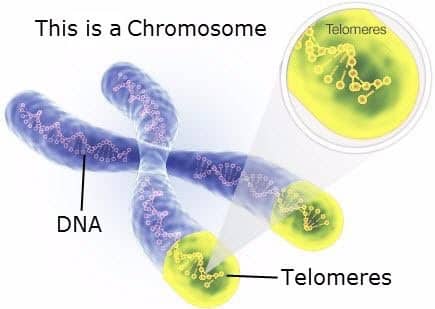
Inflammation Shortens Telomeres and Accelerates Aging & Disease
Chromosomes are long sequences of DNA that contain all of our genetic material. Telomeres sit at the ends of our chromosomes; they protect the DNA from becoming damaged. Think of a telomere as the protective plastic at the end of a shoelace—it prevents the shoe lace (or chromosome) from fraying and breaking.
Telomeres are important to aging because they slow down or even halt cell death. Throughout our lives our cells are constantly dividing. Each time our cells divide the telomeres that sit on the ends of the chromosomes become shorter. So as time marches on, and our cells divide over and over, the telomeres get shorter and shorter.
There is a critical point at which the telomere becomes too short—the cell can no longer divide, the chromosome is unprotected and the cell dies. Another name for cell death is aging.
Telomeres shorten due to cell division; but there are other causes. Stress, chronic disease, infection and inflammation contribute to telomere shortening.
Researchers have determined that maintaining telomere length is critical to preventing age-related diseases. There is an enzyme in our bodies called telomerase that helps to maintain telomere length. It has been shown that telomerase is the key to healthy cell division—increasing telomerase activity in our cells increases telomere length and improves the function and lifespan of our cells! Telomerase is key to slowing or even halting the aging process.
What has been shown to reduce telomerase activity and lead to shorter telomeres? Inflammation!! Both high oxidative stress and inflammation have been linked to shorter telomeres. Anything that causes chronic inflammation can adversely affect telomerase activity. There are many different causes of chronic inflammation. Here are a few:
- Chronic stress that activates the cortisol and adrenalin systems;
- Insufficient sleep duration;
- Obesity—chronic inflammation in white adipose tissue results from chronic activation of the immune system. This often leads to insulin resistance, impaired glucose tolerance and Type 2 Diabetes;
- Physical stress;
- Gastrointestinal Issues: food allergies, poor diet, leaky gut;
- AutoImmune Disorders;
- Insulin Levels;
- Hormonal imbalances;
- Chemical & Toxin exposure;
If you have any of the above health conditions or exposures, it is imperative that you take efforts to lower your overall inflammatory load and increase your telomerase activity.
Here are Strategies to Reduce Inflammation & Increase Telomerase Activity
- Eat a low-inflammation diet: low in refined sugars but high in lean protein, fruits, vegetables and Omega-3 fats.
- Improvement in lifestyle activities, like exercise. A publication in 2008 by Dr. Dean Ornish suggested that men with prostate cancer who undertook changes in diet and lifestyle within three months showed improvements in telomerase activity. Whole body cryotherapy can assist in promoting a healthier lifestyle and exercise by reducing pain, inflammation and excess weight.
- Increase anti-oxidant status. Telomeres appear to be especially vulnerable to free radicals. Antioxidants counteract oxidative stress and free radicals. Whole body cryotherapy has also been shown to increase antioxidant status after just one session. (1)
- Practice Stress Management: Meditation, exercise and whole body cryotherapy have all been shown to lower the stress-hormone cortisol within the body. (2)
- Hormonal therapy: increased testosterone has been linked to increased telomerase activity. Whole body cryotherapy has been shown to increase testosterone naturally in men. (3)
In conclusion, a poor diet, sedentary lifestyle, high stress, sleep-deprivation and pre-disposition to autoimmune disorders can lead to high inflammation and adversely affect telomerase functionality. Fortunately, there are therapeutic interventions such as whole body cryotherapy that can directly lower inflammation and restore telomerase activity (and halt or even reverse aging!). Whole body cryotherapy has been shown to increase exercise capacity and antioxidant status while reducing stress, insomnia and inflammation. Whole body cryotherapy can also regulate male and female hormones to help maintain telomere length.
Want to live longer and better? Whole body cryotherapy can help maintain your telomerase activity, your telomere length and let you age gracefully!!
- Eur J Appl Physiol. 2012 May; 112(5): 1645–1652. PMC3324698 “Effect of short-term cryostimulation on antioxidative status and its clinical applications in humans” Elżbieta Miller, Łukasz Markiewicz, Joanna Saluk, and Ireneusz Majsterek
- J Biol Regul Homeost Agents. 2014 Apr-Jun;28(2):291-300. Salivary steroid hormone response to whole-body cryotherapy in elite rugby players. Grasso D Lanteri P, Di Bernardo C, Mauri C, Porcelli S, Colombini A, Zani V, Bonomi FG, Melegati G, G Banfi, G Lombardi
- Salivary steroid hormone response to whole- body cryotherapy in elite rugby players Journal of biological regulators and homeostatic agents · July 2014 Simone Porcelli, G Lombardi, A Colombini
